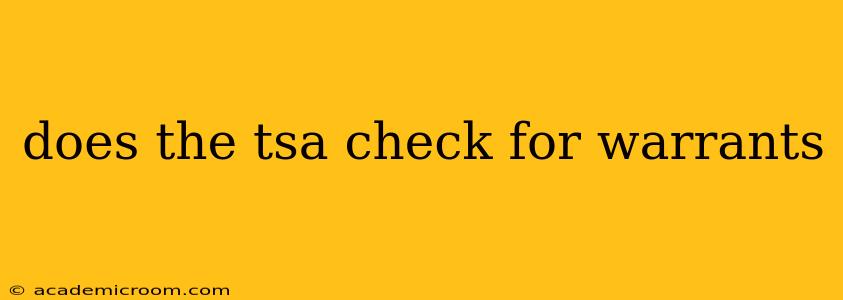Does the TSA Check for Warrants? Understanding TSA Procedures and Passenger Rights
The question of whether the Transportation Security Administration (TSA) checks for warrants during airport security screenings is a complex one, often misunderstood. The short answer is: no, the TSA's primary function is not to check for outstanding warrants. Their focus is on aviation security. However, there's a crucial nuance to this. Let's explore the details.
What is the TSA's Role at Airports?
The TSA's main objective is to prevent terrorist attacks and other threats to aviation security. Their screenings at airports utilize technology and trained personnel to detect weapons, explosives, and other prohibited items that could compromise flight safety. They are not law enforcement agents in the traditional sense.
How Does Law Enforcement Interact with the TSA?
While the TSA doesn't proactively search for warrants, there's a potential for interaction with law enforcement. This usually happens in situations where:
- A passenger's identity triggers a "hit" in a database: If a passenger's information flags a potential issue (not necessarily a warrant, but possibly a watchlist or other alert), the TSA may alert law enforcement. This is done through established protocols and procedures designed to balance security concerns with passenger rights.
- Law enforcement initiates an inquiry: Law enforcement agencies can request that the TSA detain a specific individual for questioning or arrest. In this case, the TSA would cooperate with the authorities but only after receiving a formal request. The TSA itself doesn't initiate such actions.
- Suspicious behavior: While not a direct warrant check, TSA agents are trained to observe passenger behavior. If they witness suspicious activity, they may contact law enforcement. This could potentially lead to a warrant check if the suspicions are serious enough.
Will the TSA Arrest Me if I Have an Outstanding Warrant?
The TSA will not arrest you for an outstanding warrant. They will, however, likely alert law enforcement if your identity triggers a "hit" in relevant databases. The subsequent action – arrest or not – will depend entirely on the specific warrant and the involved law enforcement agency.
What are My Rights During a TSA Screening?
You retain your Fourth Amendment rights (protection against unreasonable searches and seizures) even during TSA screenings. While the TSA has broad authority to conduct security screenings, those screenings must adhere to reasonable procedures. If you believe your rights have been violated, you can file a complaint with the TSA.
Can the TSA Search My Belongings Without My Consent?
The TSA can search your belongings without your consent as part of the security screening process. However, this is not a search for warrants. The search is limited to identifying potential threats to aviation security. Excessive or intrusive searches might be subject to challenge if deemed unreasonable.
What Happens If Law Enforcement Wants to Question Me?
If law enforcement wants to question you, they must follow established legal procedures. The TSA will not independently facilitate an interrogation; the authorities will need to initiate their own process. You have the right to remain silent and to request legal counsel.
In summary, the TSA does not check for warrants. Their role is focused on aviation security. Any interaction with law enforcement concerning outstanding warrants is incidental and only occurs following a formal request or through a database flag triggered by passenger information. Understanding your rights and the TSA's limited role in law enforcement ensures a smoother travel experience.
